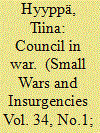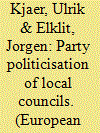| Srl | Item |
| 1 |
ID:
189350


|
|
|
|
|
| Summary/Abstract |
governance have been neglected. This article explores the local council established in the rebel-held city of Daraya, Syria. It informs the fields of rebel governance and civil resistance, specifically wartime order, during civil wars and proposes that the forms and practices of local governance in Daraya exhibited a type of governance best labelled as ‘civilocracy’. In contrast to councils in other opposition-held parts of Syria, the council was established and led by civilians who welcomed rebels to work with them. Based on findings from in-depth, semi-structured interviews with former council members, the article finds that four factors were crucial for this form of governance to emerge and to endure. Key wartime events – a massacre and a siege –, earlier experiences of nonviolent activists, local ties, and the creation of a military office created a space for the maintenance of civil-led order. Daraya offers a fascinating example of how community’s norms affected how rebel governance was created and maintained. This research introduces a new concept to explain wartime order and encourages researchers to find causal explanations for the emergence of this particular governance form in other conflicts.
|
|
|
|
|
|
|
|
|
|
|
|
|
|
|
|
| 2 |
ID:
094980


|
|
|
|
|
| Publication |
2010.
|
| Summary/Abstract |
Local government party systems are not necessarily copies of the national party system. In many countries, local party systems have come to resemble the national one more and more - a process Rokkan termed 'party politicisation'. The traditional expectation has been that the take-over of local politics by political parties, through a gradual process of societal modernisation, would eventually be complete. More recently, however, it has been suggested that reorganisations of the institutional set-up - that is, amalgamations of municipalities - could entail developments in the degree of local party system nationalisation. This article investigates cultural and institutional explanations for party politicisation by analysing the Danish case from 1966 to 2005 - a period that witnessed both major amalgamation reforms and periods of stability in the local government structure. The data suggest that dramatic party politicisation does not lend itself to cultural explanations, but originates exclusively from changes in the institutional set-up. Party politicisation is not a gradual process, but comes - at least in Denmark - in leaps coinciding with major reorganisations of the local government structure.
|
|
|
|
|
|
|
|
|
|
|
|
|
|
|
|